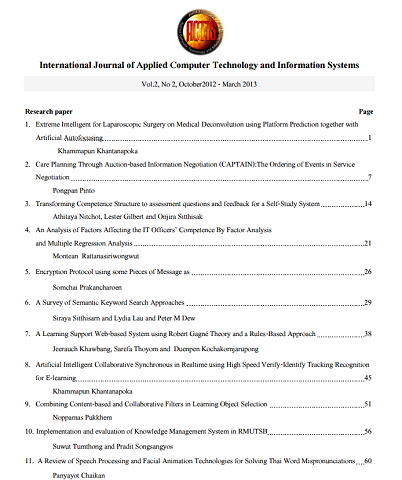Implementation and evaluation of Knowledge Management System in RMUTSB
Main Article Content
Abstract
In the changing world, people seeking for new knowledge continuously. One of the important factors to stimulate and achieve the strategic goals of the organization is knowledge management. Even though, the knowledge management concept has been adopted for decades, but the organizations still have not successful in implementation. Especially in higher education, which responsible for create and transfer of knowledge to people as well. The study found that, CopWeb is used as the training tool for sharing of knowledge. It is consist of knowledge acquisition and capture subsystem, knowledge sharing subsystem, knowledge representation subsystem, and management and administration subsystem. The knowledge management system using CopWeb technique in Rajamangala University of Technology Suvarnabhumi has implemented recently can work properly. The proposed system can be extended and distributed the knowledge, also can be searching through the Internet as well. The respondents were satisfied with the knowledge management service. Most of them are support staff followed by 27 faculty members. From distribution of 4 campus. The overall satisfaction is at a high level. Most of them are satisfied in the system usage steps, followed by information service and quality of services. The comparative study of the implementation of knowledge management in different scales of institution, or comparative study of implementation of knowledge management in different industrial sectors will be presented.
Article Details
Section
ACTIS Article
It is the policy of ACTISNU to own the copyright to the published contributions on behalf of the interests of ACTISNU, its authors, and their employers, and to facilitate the appropriate reuse of this material by others. To comply with the Copyright Law, authors are required to sign an ACTISNU copyright transfer form before publication. This form, a copy of which appears in this journal (or website), returns to authors and their employers full rights to reuse their material for their own purposes.

